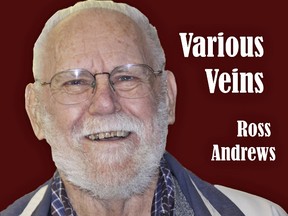Various Veins

Article content
A new year dawns. What will it bring?
The editors of Maclean's invited 100 prominent people to express in 15 words their prediction for 2015. That's quite a challenge, but in these days of twitters and tweets maybe it's not so tough.
The submissions are wildly different in in focus. That shouldn't surprise us. The attention of most people is on their immediate hopes. A hockey player's life is about goals and assists and trophies. A gambler knows somebody has to win. Why not me?
The January issue of Scientific American offers hints for the new year.
Rene Heller writes about planets and moons that may be better places to live than our own. He paints no rosy future for Earth, mostly based on the evolution of our sun rather than to bumbling of earthlings in all sorts of ways. It's all academic anyway. Humans have no way to reach better digs and even if we did the local inhabitants would hardly welcome immigrants, unless as fodder.
So astrophysicists may espy a new planet or 10 in 2015 which will give them a flush of pleasure. The joy of the chase.
The old year stole our free will by scanning our domes while we made choices. Not so fast, says Eddy Nahmias. We are not simply biochemical puppets, he says.
He begins his essay in much the same way I start creating a column. Readers often ask where I get my ideas. It's a tough question to answer. Nahmias argues that going through this creative process proves we have free will.
Whether he's right or not, it's comforting for law makers, lawyers, judges and juries. If humans have no free will they cannot have intention to commit a crime and so cannot be locked up or fined. Drivers' licences would be useless.
Equipment for locating sunken ships, sunken cities, crashed aeroplanes is enabling faster underwater archeology. Maybe the arms of the Venus de Milo will be found in 2015. Or have they been found? Or did she never have arms?
There is progress in the Red Queen world of microbes. Until now microbes have been able to develop immunity to drugs in a very short time. As the Red Queen told Alice, "In this world you have to run as fast as you can to stay in the same place." Carl Zimmer writes about a new way to attack microbes. Good news at a time when microbes are pretty well immune to antibiotics. He compares microbial colonies to ant colonies. They communicate among themselves and cooperate in keeping the colony healthy. The new approach is designed to mess up the machinery and so wipe out the whole colony.
Our guts are filled with good bacteria and one thing to avoid is accidentally wiping them out. There is much to be done in this field.
A supplement in the magazine describes problems and progress in dealing with haemophilia. The disease exists in two forms. Queen Victoria is believed to have had a spontaneous mutation that was passed along to many of her descendants. The story of Alexei, son of Nicholas II and Alexandra made the disease widely known. Rasputin's role added to the fascination.
Hope for treating haemophilia with genetic engineering came to a crashing halt when a patient was killed. It isn't only accidental cuts to be feared.
Knee joints can be destroyed by the bleeding from internal abrasions.
So many lines of experiment are on going, surely one or more will succeed in 2015.